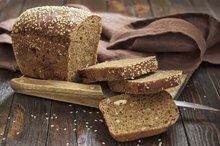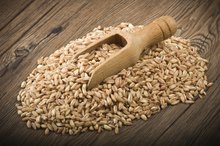Vitamins in Bread
Bread has long been part of the human diet -- unleavened bread was consumed over 12,000 years ago, and bread made up a staple in ancient Greek, Egyptian and Roman diets. Bread provides essential nutrients including carbohydrates for energy, as well as minerals -- such as selenium and iron -- needed for tissue health. Consuming bread also boosts your intake of several essential nutrients, though different types of bread differ in their specific vitamin content.
Thiamine
Adding bread to your diet helps you consume more thiamine, or vitamin B-1. Thiamine, along with the other seven B-complex vitamins, maintains liver health, supports your metabolism and promotes healthy skin. It also supports your immune system and helps your body deal with physiological stress. Rye, white, whole-wheat and French breads each provide between 0.2 and 0.3 milligram of thiamine per 2-ounce serving -- a significant portion of the 1.1 and 1.2 milligrams that the Institute of Medicine recommends daily for women and men, respectively.
- Adding bread to your diet helps you consume more thiamine, or vitamin B-1.
- Thiamine, along with the other seven B-complex vitamins, maintains liver health, supports your metabolism and promotes healthy skin.
Niacin
Rye Bread Vs. Multigrain Bread
Learn More
Bread also provides you with niacin, also called vitamin B-3 7. Like thiamine, it helps your body deal with stress, and niacin plays a role in the production of anti-stress hormones. It also helps you synthesize sex hormones and supports your circulatory system. White and French breads are rich in niacin. A 2-ounce serving of either bread provides you with 2.7 milligrams of niacin -- 19 and 17 percent of the recommended daily niacin intakes for women and men, respectively. Whole-wheat bread contains slightly less niacin, at 2.5 milligrams per serving, while rye bread offers 2.2 milligrams per serving.
- Bread also provides you with niacin, also called vitamin B-3 7.
- A 2-ounce serving of either bread provides you with 2.7 milligrams of niacin -- 19 and 17 percent of the recommended daily niacin intakes for women and men, respectively.
Folic Acid
Bread also comes loaded with vitamin B-9, or folic acid 8. Perhaps best known for its importance during pregnancy, folic acid helps reduce the neural birth defects that can develop soon after conception. The folic acid from your diet also helps you synthesize new DNA, an important process for new cell growth, and also supports mental health. French bread is one of the highest in folic acid, at 130 micrograms per 2-ounce serving, while white and rye breads each provide between 80 and 90 micrograms per serving, or slightly less than one-quarter of the 400 micrograms of folic acid you need daily. Whole-wheat bread is lower in folic acid, at 24 micrograms per serving.
- Bread also comes loaded with vitamin B-9, or folic acid 8.
- The folic acid from your diet also helps you synthesize new DNA, an important process for new cell growth, and also supports mental health.
Vitamin E
Can Diabetics Eat Rye Bread & Pumpernickel Bread?
Learn More
Whole-wheat bread provides a significant amount of vitamin E, which helps you produce red blood cells -- an ongoing process essential for proper oxygen transport. It also functions as a potent antioxidant, which means that it prevents or corrects oxidative damage, which would otherwise contribute to arthritis, cancer and other chronic diseases. Each 2-ounce serving of whole-wheat bread contains 1.5 milligrams, or 10 percent of your recommended daily vitamin E intake. Rye, white and French breads provide only small amounts of vitamin E.
- Whole-wheat bread provides a significant amount of vitamin E, which helps you produce red blood cells -- an ongoing process essential for proper oxygen transport.
Related Articles
References
- Penn State University Cooperative Extension: Breads and Other Cultures
- USDA National Nutrient Database: Bread, Rye
- USDA National Nutrient Database: Bread, White, Commercially Prepared
- USDA National Nutrient Database: Bread, Whole-Wheat, Commercially Prepared
- USDA National Nutrient Database: Bread, French or Vienna, Includes Sourdough
- University of Maryland Medical Center: Vitamin B-1 (Thiamin)
- University of Maryland Medical Center: Vitamin B-3 (Niacin)
- University of Maryland Medical Center: Vitamin B-9 (Folic Acid)
- University of Maryland Medical Center: Vitamin E
- Brick Oven Premium White Bread. SmartLabel. Updated 11/13/2018
- White bread, wheat flour. The University of Sydney Glycemic GI Index. Updated November 2019
- What's A Whole Grain? A Refined Grain? Oldways Whole Grain Council.
- Folate. National Institutes of Health Office of Dietary Supplements. Updated July 11, 2019
- Thiamin. National Institutes of Health Office of Dietary Supplements. Updated July 11, 2019
- Wheat Allergy. American Academy of Allergy, Asthma, and Immunology.
- Commercial Bread Products. USDA FoodKeeper app. Updated April 26, 2019
Writer Bio
Sylvie Tremblay holds a Master of Science in molecular and cellular biology and has years of experience as a cancer researcher and neuroscientist.









